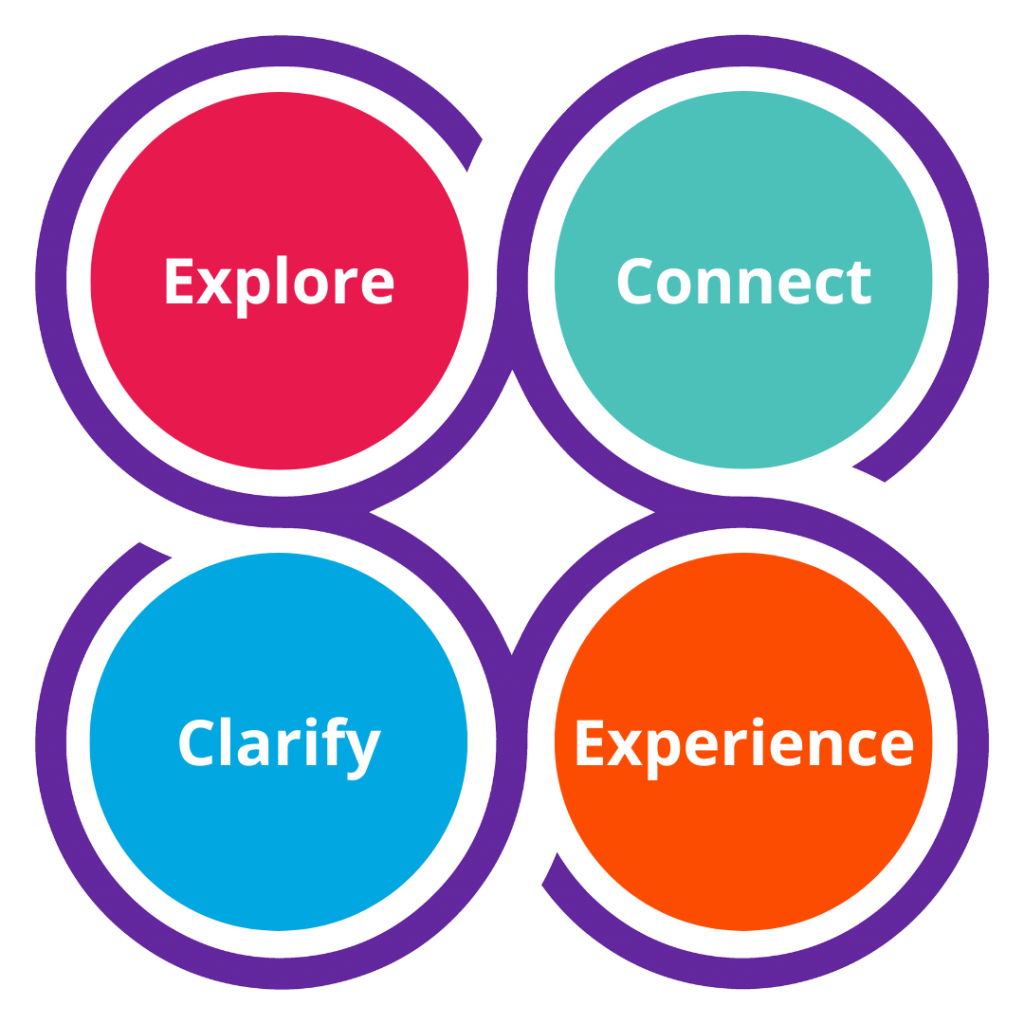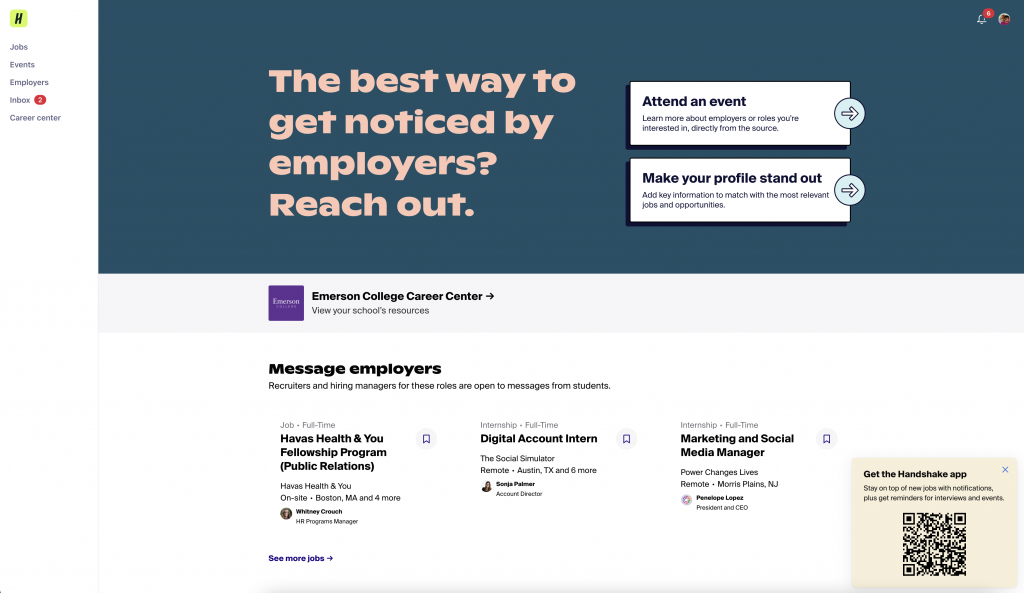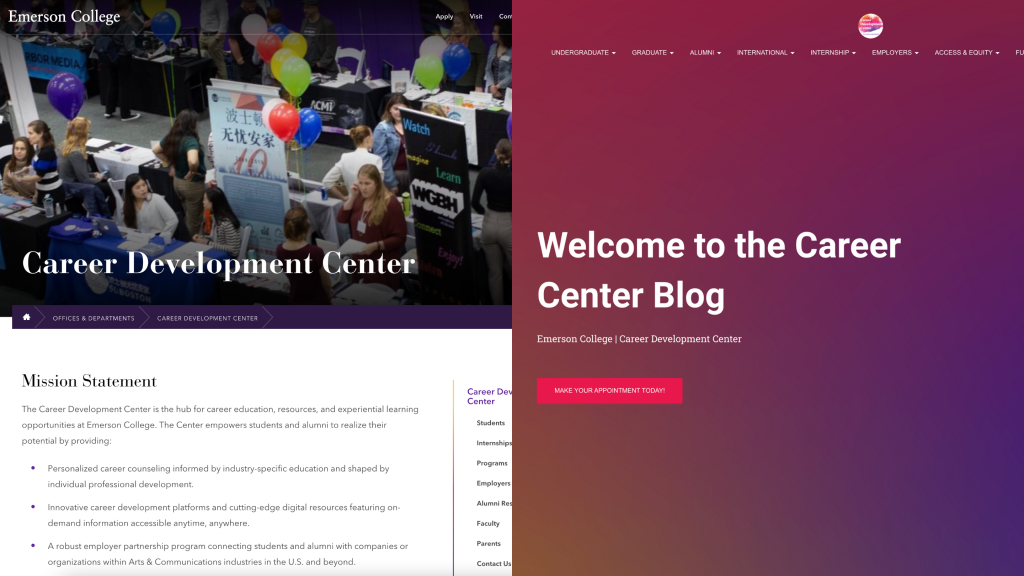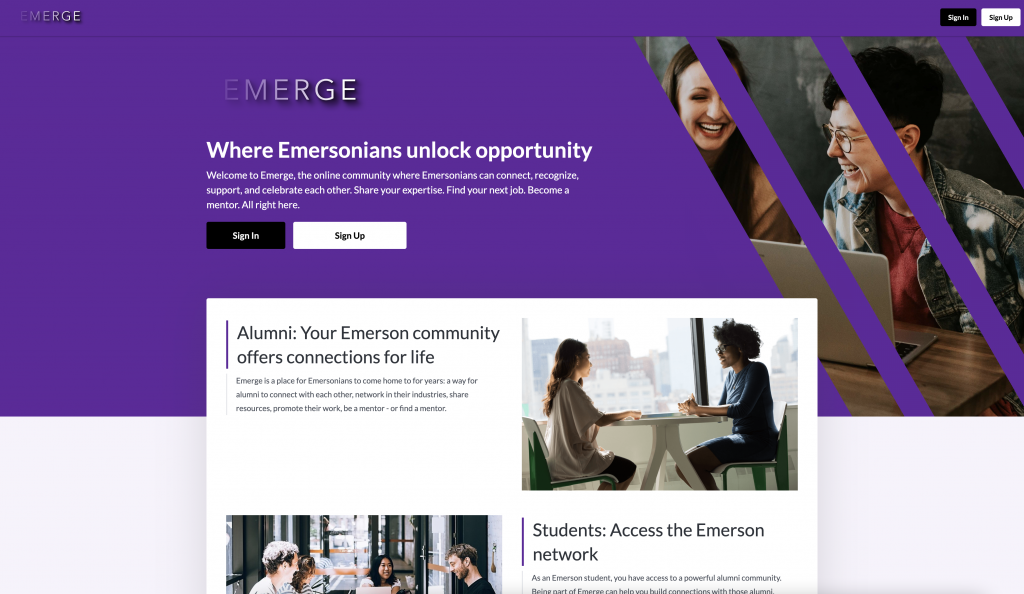Maximizing the time after First-Year and before graduation year
As you begin to experience Emerson after your first year, declaring a major and pursuing career paths, a lot of exciting things will happen to help shape your perspective, identity, and how you want to make an impact in the world. Here are some steps, tips, and resources to keep you organized as you gather information and learn.

Career Development Cycle
Explore: Take time to understand how your skills, interests, and values and how they connect to different industries, companies, and roles through research.
Connect: Engage with peers, family, and industry professionals including alumni to learn about career paths, industries, and insider tips.
Experience: Build your experiences and skills through classes, campus leadership, on-campus employment, internships, and more.
Clarify: Always make time to reflect and clarify your learning and goals. Redirect as needed and remember the career development center is here to help you navigate.
Support for challenges with the internship and job search:
Balancing a productive internship or job search and deciding what you want to do after you graduate can be stressful at times. Consider the resources through Emerson’s Concern Center to help assist you!
CHECKLIST
Explore
- Finalize major sophomore year
- Continue exploring career paths-Occupational Outlook, RoadTrip Nation, Industry Guides
- Build a research “parking lot” as you gather information using the Career Pathways doc
Connect
- Draft resume and update as needed
- Create a LinkedIn profile and update it as needed
- Weekly outreach to alumni through Emerge and LinkedIn
- Ongoing career advising appointments
- Practice interviewing
- Attend career fairs/events + practice networking both at Emerson and outside of Emerson
PRO TIP: Use a multi-layered schedule
Develop a schedule that:
- Highlights notes from the day’s job search activities
- Balances job search activities, school obligations, work commitments, and personal life to
- Provides a long-term dashboard to track big-picture goals, application deadlines
Experience
| Building Experience on campus: | Experiential Learning/Off Boston Campus Experience: |
| Exchange Experiences/Study Abroad | |
| Academic projects, courses, faculty | Study Abroad |
| Research projects with faculty | Global Pathways Programs |
| Independent study | Emerson Los Angeles (ELA) |
| Career Development Courses | Emerson College, D.C. Program |
| Campus Engagement | Internships |
| Student Engagement and Leadership (SEAL) – Pursue leadership roles in clubs | Cheat sheet (add internships links when updated) |
| Athletics | Pdfs |
| Student Government Association (SGA) | Emtern Program |
| On-Campus Work | Building Experience on Campus: |
| Student Government Association (SGA) | EAJS Career Guides |
| Off Campus Work | |
| There are tons of customer service opportunities at local restaurants and retail stores in the area as well as temp/staffing agencies for more office-based work. | |
Clarify
- Regularly reflect on your professional development experiences and what you’re learning
- Review NACE Career Competencies(link to competencies doc) and how your experiences are enhancing this skillset
- Build and start practicing STAR stories using STAR stories document and highlight your strengths when networking, writing cover letters and interviewing
- Check in with career advisors, faculty, peers and industry experts as you continue to learn about career pathways and see how what you’re learning helps informs career options
PRO TIP: A career is a trajectory you build and look back on.Your industry and job titles can change multiple times throughout your career
Resource Checklist

- Build your Handshake profile.
- Schedule an Intro to the Career Center appointment.
- Explore internships and job postings.
- Explore employer profiles by industry and location.
- RSVP and attend Career Center events with employers and alumni.

Emerson.edu & Career Center Blog
- Utilize our online resources
- Use a resume guide to draft a resume and submit it to Career Center staff for review.
- Use a cover letter guide to draft cover letters for specific positions and to Career Center staff for review.
- Review industry guides to find job posting sites, professional associations, and more.
- Check out blog posts and other resources.
Major Decisions
There is a big misconception that what you major in at college defines your career path for life. While choosing a major is a big decision, it doesn’t define you. A career takes time to build and capitalizes on what you learn in classes, internships, student organization experiences, and life! You can take highlights from these areas and create compelling stories about who you are and what you bring to the table.
When considering your major, find something that is a solid mix of your skills, interests, and values and that gives you multiple options to pursue.
Explore these campus and external resources that can help you learn how majors can be translated into careers:
- Occupational Outlook Handbook O-net
- Road Trip Nation
- CDC Industry guides
- Academic advising appointments
- Career advising appointments
- Conversations with those whose career experience appeals to you:
- Faculty
- Alumni in Emerge
- Friends, Family, and Peers
Star Stories
What are STAR stories?
STAR stories are a great way to demonstrate with specific and concise examples how your experiences have prepared you for future opportunities. Not only can they be used when answering a behavioral-based interview question they are also a great way to highlight your experience and skills when networking and promoting yourself in cover letters.
STAR Definition
Situation – Describe where you were working /interning/ volunteering etc.
Task – What were you tasked with, what problem were you trying to solve?
Action – How did you take steps to complete what was asked of you?
Result – What happened because of your actions/outcomes?
STAR stories are strongest when they are specific, concise, and you quantify and qualify your experience.
Example – Tell me about a time when you demonstrated your initiative to take the lead on a project?
Weak Example: I served as outreach chair of the Emerson College Improv Club for 2 years.
Stronger Example: Serving as outreach chair for the Emerson College Improv Club, I was asked by our president to help increase our audience at shows. I developed a targeted social media campaign of weekly posts on TikTok and Instagram that increased our followers by 25% and brought our audience numbers at our Fall Show from 35 to 100 guests.
Now develop STAR stories for your Emerson experience on campus and beyond to tell your story as you begin networking with employers and alumni in search of opportunities:
- On-Campus Job
- Student Organizations
- Athletics
- Academics
- Study Abroad
- Internships
- Off-Campus Jobs
- Volunteering
Career Pathways
Review alumni profiles in Emerge and on LinkedIn. See how they have translated their majors into roles within industries. Research employer profiles in Handshake. Explore job titles and companies that could use the skills you’re developing from your major, which also identify with your values and interests. Click the button on the side to make your copy of the Career Pathways Grid!
If you have any questions, please contact us!

